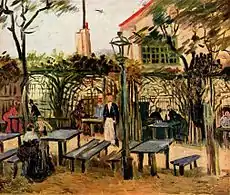

The guinguette (French pronunciation: [ɡɛ̃ɡɛt] ⓘ), originating in the 17th Century, was a type of popular tavern in the suburbs of Paris and of other cities in France.[1] The term comes from guinguet, a type of cheap green wine served there.[1] A goguette was a similar kind of establishment.
History
During the 18th century, a consumer revolution led once isolated villages and hamlets outside Paris to be swept up in a booming material culture. Commodities, and particularly alcohol, consumed outside the customs barrier of the city were considerably cheaper, being exempt from state taxes. This encouraged the growth of an entertainment industry just beyond the tax man's reach and a network of drinking establishments was established. They were especially popular on Sundays and holidays, when Parisians would visit to enjoy themselves and to get drunk cheaply.[2] Today, the term 'guinguette' is still used for a waterside refreshment stand, particularly open-air, all over France.[3]
The development of railways in the 1880s and the establishment of the "Gare de la Bastille" (Bastille station) with many trains serving the eastern suburbs of Paris (such as Nogent sur Marne) contributed to the success of guinguettes.[3]
Geography
The majority are on the edges of the Seine and the Marne rivers, and some are in a district that stretches to the outskirts of Rouen. Some guinguettes were however far from the rivers, as the picturesque guinguettes of le Plessis-Robinson built among the chestnut trees. There were hundreds of guinguettes as far away as Nogent-sur-Seine, where the nature of the Seine valley changes most.
Decline and rebirth of the tradition
Today guinguettes are objects of nostalgia. The guinguettes were marvelous places to return to lighter times during the Années folles of the 1920s. They were obviously an eminent subject for painting during the first half of the 20th century.
But television and the ban on bathing in the rivers in the 1960s caused the decline of guinguettes. This ban was justified for reasons of hygiene (water quality deteriorated in the 1960s and 1970s) and safety (the risk due to barge traffic and drowning). In the 1960s, guinguettes became a subject of nostalgia. Many people forgot guinguettes, as the French scriptwriter Michel Audiard had one of his characters point out. Since the 1980s, there has been a small revival, particularly along the Marne river. In 2008, some guinguettes were open every weekend.
As of 2011 a gradual return to modern guinguettes had begun.[4]
See also
References
- 1 2 Ménage, Gilles (1750). "Guingette". In Jault, Auguste François (ed.). Dictionnaire étymologique de la langue françoise (in French). Vol. 1 (Nouvelle ed.). Paris: Briasson. p. 724. OCLC 813388692. Retrieved 23 March 2023.
GUINGUETTE. Petit cabaret dans les fauxbourgs & les environs de Paris, où les Artisans vont boire en Eté , les Dimanches & les Fêtes. Ce terme est nouveau. Il vient apparemment de ce qu'on ne vend dans ces cabarets que de méchant petit vin verd , que l'on appelle ginguet , tel qu'est celui qui se recueille aux ênvirons de Paris. Voyez ginguet. *
[Small tavern in the suburbs & surroundings of Paris, where the craftsmen go to drink in Summer, on Sundays & Festivals. This term is new. It apparently comes from the fact that in these taverns they only sell nasty little green wine, which they call "ginguet", such as is harvested in the outskirts of Paris. See 'ginguet'.] - ↑ Jones, Colin (2004). Paris - Biography of a City, p. 226, Allen Lane, ISBN 0-7139-9321-9
- 1 2 Deberne, Henri Joannis (March 1999). Danser en société, Christine Bonneton editor, Paris ISBN 2-86253-229-0
- ↑ Lauter, Devorah (June 28, 2011). "French travel back to simpler time". Los Angeles Times. Archived from the original on April 14, 2017.
Movies with guinguettes
- Nogent, Eldorado du dimanche ("Nogent, Sunday Eldorado") - Marcel Carné, 1929
- La belle équipe ("The Fine Crew") - Julien Duvivier, 1936, with Jean Gabin singing the well-known waltz Quand on s'promène au bord de l'eau ("Walking at the Water's Edge")
- Casque d'or ("Golden Helmet") - Jacques Becker, 1952
External links
- web site of a guinguette on the Marne river (in French)
- website of the "Culture Guinguette" association (in French)